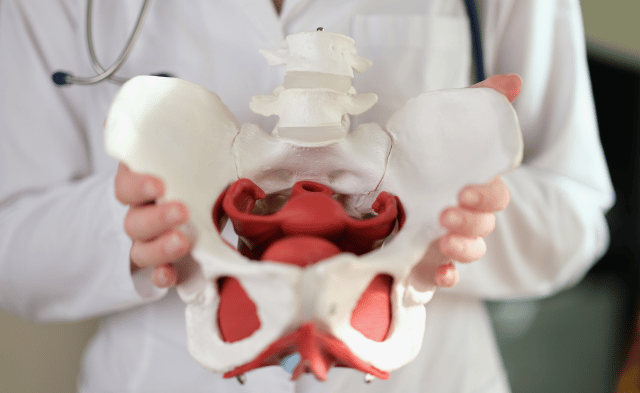At Vancouver Physiotherapy Hub, we pride ourselves on being at the forefront of health and wellness in downtown Vancouver. Our team of exceptionally talented physiotherapists is dedicated to helping Vancouverites lead active, pain-free lives. Living in a city that embraces outdoor activities like running, cycling, and hiking, it’s no surprise that the health of our community is a top priority. However, one crucial aspect of physical health that often goes overlooked, especially by runners, is pelvic floor health.
Pelvic floor health plays a vital role in ensuring that your body can perform at its best, whether you’re training for your next marathon or enjoying a leisurely jog along the Seawall. In this post, we’ll explore the significance of pelvic floor health in running, the potential issues that can arise from an imbalanced pelvic floor, and how pelvic floor physiotherapy can help you maintain optimal performance and comfort on your runs.
For pelvic floor physiotherapy treatments, we recommend the following:
Pelvic Floor & Running
Understanding the Pelvic Floor Muscular System
The pelvic floor is a complex group of muscles, ligaments, and tissues located at the base of your pelvis. These muscles stretch like a hammock from your pubic bone at the front to your tailbone at the back, supporting the bladder, bowel, and, in women, the uterus. The pelvic floor muscles are responsible for controlling the release of urine, feces, and gas, play a critical role in sexual function and childbirth, and provides a strong base for your musculoskeletal system.
When you run, your pelvic floor muscles work in coordination with your core and lower limb muscles to stabilize your pelvis and spine. This stabilization is essential for maintaining proper posture, balance, and alignment during movement. A well-functioning pelvic floor also helps manage the increased pressure within the abdominal cavity that occurs during high-impact activities like running.

Running Issues & Your Pelvic Floor
With the impact and strain that running puts on our body, issues with your pelvic floor strength can cause a whole host of issues, including:
Urinary Incontinence
Urinary incontinence is one of the most common issues linked to pelvic floor dysfunction, particularly among female runners. When the pelvic floor muscles are weak or overstretched, they may struggle to provide adequate support to the bladder, leading to involuntary leakage of urine, especially during high-impact activities like running. This can range from occasional leaks to more severe cases where running becomes difficult without protection.
Pelvic Organ Prolapse
Pelvic organ prolapse occurs when one or more of the pelvic organs (bladder, uterus, or rectum) descend from their normal position due to a weakened pelvic floor. This condition can cause discomfort, a feeling of heaviness or bulging in the pelvic area, and even pain during physical activity. For runners, this can be particularly challenging, as the impact of running can exacerbate symptoms and make exercise uncomfortable or even impossible.
Lower Back Pain
The pelvic floor muscles are an integral part of your core, working closely with the deep abdominal muscles, diaphragm, and lower back muscles. When the pelvic floor is weak or imbalanced, it can disrupt the harmony of this muscle group, leading to instability in the pelvis and spine. This instability often manifests as lower back pain, which can hinder your running performance and overall quality of life.
Hip Pain and Dysfunction
A dysfunctional pelvic floor can also contribute to hip pain and dysfunction. The pelvic floor muscles are connected to the muscles that control hip movement, and any imbalance can affect how these muscles function. For runners, this can lead to issues such as hip impingement, bursitis, or even chronic hip pain that persists beyond running.
Digestive Issues
The pelvic floor also plays a role in supporting the organs responsible for digestion. An imbalanced pelvic floor can lead to digestive issues such as constipation or difficulty with bowel movements. For runners, who rely on a well-functioning digestive system to fuel their performance, this can be a significant concern.
What Can You Do? Pelvic Floor Physiotherapy.
What is Pelvic Floor Physiotherapy?
Pelvic floor physiotherapy is a specialized form of physiotherapy that focuses on the assessment and treatment of the pelvic floor muscles. It is designed to address issues such as incontinence, prolapse, pain, and dysfunction related to the pelvic floor. This type of therapy is performed by physiotherapists who have undergone specialized training in pelvic health and are equipped with the knowledge and skills to help patients regain control and strength in their pelvic floor muscles.

How Pelvic Floor Physiotherapy Can Help?
Urinary Incontinence
Through targeted exercises, biofeedback, and manual therapy, pelvic floor physiotherapy can strengthen the pelvic floor muscles, improve bladder control, and reduce or eliminate urinary incontinence. Physiotherapists may also educate patients on lifestyle modifications and bladder training techniques to further enhance outcomes.
Pelvic Organ Prolapse
Pelvic floor physiotherapy can help manage and reduce the symptoms of pelvic organ prolapse by strengthening the pelvic floor muscles and improving pelvic alignment. Physiotherapists may also teach patients how to manage intra-abdominal pressure during physical activities to prevent further prolapse.
Lower Back Pain
By addressing the root cause of pelvic floor dysfunction, pelvic floor physiotherapy can alleviate lower back pain. Physiotherapists may incorporate exercises that target the entire core, improving overall stability and reducing the strain on the lower back during running.
Hip Pain and Dysfunction
Pelvic floor physiotherapy can improve hip function by restoring balance to the pelvic floor muscles and addressing any related muscle imbalances. This can lead to better hip mobility, reduced pain, and improved running mechanics.
Digestive Issues
For runners experiencing digestive issues related to pelvic floor dysfunction, pelvic floor physiotherapy can help by improving muscle coordination and strength. Physiotherapists may also provide advice on diet, hydration, and bowel habits to support optimal digestive health.
Pelvic Floor Physiotherapy at Vancouver Physiotherapy Hub
At Vancouver Physiotherapy Hub, we take a comprehensive and personalized approach to pelvic floor physiotherapy. Our team of skilled physiotherapists is committed to providing the highest level of care, ensuring that each patient feels comfortable and supported throughout their treatment journey.
Assessment
The first step in pelvic floor physiotherapy is a thorough assessment. During this initial appointment, your physiotherapist will take a detailed history of your symptoms, medical background, and lifestyle factors. They will also conduct a physical examination, which may include an internal exam if you’re comfortable, to assess the strength, tone, and function of your pelvic floor muscles. This assessment allows the physiotherapist to develop a tailored treatment plan that addresses your specific needs.
Treatment
Treatment for pelvic floor dysfunction is highly individualized and may include a combination of exercises, manual therapy, biofeedback, and education. Your physiotherapist will guide you through exercises designed to strengthen and coordinate your pelvic floor muscles, improve your posture and breathing patterns, and enhance your overall core stability. Manual therapy techniques may be used to release tension and improve mobility in the pelvic region.
Treatment Plan and Homecare
Your treatment plan will be designed to help you achieve your goals and improve your pelvic floor health. This plan may include regular physiotherapy sessions, home exercises, and lifestyle modifications to support your progress. Your physiotherapist will provide clear instructions and ongoing support to ensure you feel confident in managing your pelvic floor health between appointments.
Discretion, Consent, and Comfortability
We understand that pelvic floor physiotherapy can be a sensitive and personal experience. At Vancouver Physiotherapy Hub, we prioritize your comfort and dignity at all times. Any internal exams or treatments will only be performed with your informed consent, and your privacy will be respected throughout the process. Our goal is to create a safe and supportive environment where you can focus on your health and well-being.
FAQs
What does a pelvic floor exam consist of?
A pelvic floor exam typically includes an external assessment of your pelvic muscles and, if you’re comfortable, an internal examination. The internal exam allows the physiotherapist to assess the strength, tone, and function of your pelvic floor muscles more accurately. It’s important to note that this part of the exam is only performed with your consent and comfort in mind.
How painful is pelvic floor physiotherapy?
Pelvic floor physiotherapy should not be painful. Some discomfort may be experienced during certain techniques, especially if there is muscle tension or tightness, but your physiotherapist will always work within your comfort levels. Communication is key, and your physiotherapist will ensure that any treatment is as comfortable as possible.
Is it ever too late for pelvic floor therapy?
It’s never too late to benefit from pelvic floor therapy. Whether you’re dealing with long-standing issues or newly developed symptoms, pelvic floor physiotherapy can help improve your muscle function and overall quality of life.
How to tell if pelvic floor is tight or weak?
Signs of a tight pelvic floor may include pain, difficulty relaxing the muscles, or discomfort during activities like running. A weak pelvic floor may be indicated by symptoms such as urinary incontinence, pelvic organ prolapse, or lower back pain. A thorough assessment by a pelvic floor physiotherapist can help determine the state of your pelvic floor muscles.
What should I wear to pelvic floor physiotherapy?
Wear comfortable clothing that allows you to move freely, such as athletic wear. If an internal exam is planned, your physiotherapist will provide a gown or drape for your comfort and privacy.
At Vancouver Physiotherapy Hub, we understand the importance of pelvic floor health in running and overall well-being. Our team of highly trained pelvic floor physiotherapists is here to help you overcome any challenges related to pelvic floor dysfunction, ensuring that you can enjoy your runs and maintain your active lifestyle. Whether you’re dealing with incontinence, pelvic pain, or simply want to optimize your performance, we’re here to support you every step of the way. Don’t let pelvic floor issues hold you back—book an appointment with us today and take the first step towards better health and performance.






